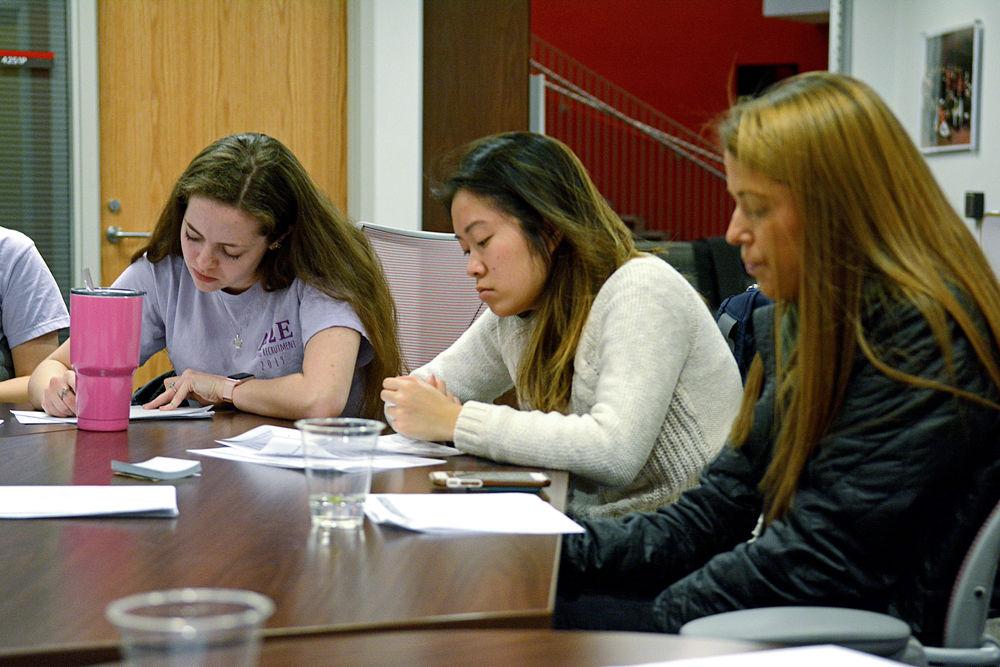On Jan. 30, the Women’s Center and Student Government hosted a Title IX comment writing party at the SG suite in Talley, following the Women’s Center’s writing party that occured two weeks ago. This comes as a response to the Department of Education’s proposal to alter the anti-sexual discrimination law, in an effort to amplify students’ voices on the matter.
Student Body President Jess Errico, a fifth-year studying mechanical and aerospace engineering, attended the event and explained that it was a continuation of ongoing efforts to get students involved in the commenting process.
“It’s just another extension of efforts to solicit student feedback,” Errico said. “The changes are significant and could have significant impact on schools across the country and specifically NC State. I’m excited that students are participating in the dialogue and participating in the opportunity to provide public feedback and public comments.”
Maddie Clayton, a first-year studying biomedical engineering, said she had been the victim of stalking in the past; in order to get a restraining order, she had to face her stalker in a cross-examination, which was very difficult.
“I experienced interpersonal violence and relationship violence, so that’s why I got my job at the Women’s Center,” Clayton said. “I heard about this, and I heard about some of the changes. I personally know how hard it is to go through the cross-examination, and look the person you’re charging in the eye.”
Clayton said that she spread the word about the event to two of her friends, Kyle McClintock, a first-year studying chemical engineering and psychology, and Maggie Ross, a first-year studying biomedical engineering and human biology.
McClintock expressed curiosity toward the changes, and came to the event to learn more about the proposed changes to Title IX and reporting sexual assault on college campuses.
“[Clayton] told me about all the changes that are happening and gave me a general overview. It sounded really interesting and I wanted to learn more about it, to see how it would affect me.”
Clayton, McClintock and Ross came to the event to voice concerns, Ross said.
“We came here after our sorority event, because Title IX directly affects us as college women, and we wanted to make our opinion heard,” Ross said. “Survivors having to face their attackers in an interview upsets me as a victim of sexual violence. That’s not something that I would want to do in a hearing.”
Melanie Flowers, a second-year studying communications with a concentration in public relations, said she specifically had an issue with the proposal that removed universities’ obligation to investigate off-campus reporting.
“I had a lot of problems with the changes, and figured I should come here, get more information on how to write an effective comment,” Flowers said. “I think the off-campus reports is specifically problematic because it kind of allows access for this kind of thing to happen off campus. Right now, if something happened off campus, the university still has to look into it.”
Flowers said that she felt like the law’s changes were becoming unnoticed by college students, and wished more people were aware of its potential impact.
“I wish more people knew about it,” Flowers said. “I think it’s hard to publicize this kind of thing, especially since there’s a lot of political things going on right now. I think it could get lost in the news. There weren’t a lot of students here; I think we had a good amount, but I still feel like there’s plenty of people who don’t know this is happening who might’ve cared to comment on it. I don’t think it’s public enough.
Sydney Singleton, a second-year studying international studies with a focus in global cultural studies, felt unsafe with the proposed changes because he is required to study abroad and the provisions of Title IX would not protect a student studying internationally.
“Personally to me, because my major requires me to study abroad, the idea of not having protections for students that are required to study abroad, I feel like that’s a little wonky,” Singleton said. “I feel like that needs to be more fine-tuned. That’s one of my biggest concerns.”
Sam Chan, a third-year studying political science, said she was worried about the change requiring universities to only respond to reports of sexual misconduct that happens on campus, rather than also encompassing off-campus housing like the current policy has in place.
“The proposed changes to Title IX are extremely alarming to me, especially the parts about the new changes that they’re required to investigate any incident that occurs within the school’s educational program or activity,” Chan said.
Errico said that ultimately, it’s up to the university to interpret the law’s changes.
“How this will shape out for the university will depend on what the permanent changes become and how the university chooses to interpret those, and how we choose to raise the bar even higher for what it means to be a member of the Wolfpack,” Errico said.




